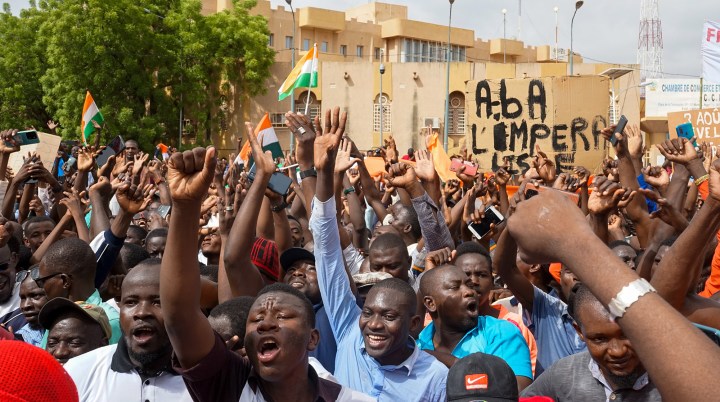AFCFTA'S PEACE ROLE OP-ED
With poverty and inequality at the heart of Niger coup, free trade can help drive peace building

Implementation of the African Continental Free Trade Area presents opportunities to mitigate the twin conflict-triggering economic challenges of poverty and inequality that often provoke political instability in the form of military coups.
The recent coup in Niger clearly indicates that when analysing armed conflicts in Africa, it is important to consider the related spheres of politics and economics – at the heart of phenomena appearing as political instabilities on the continent is marginalisation, broadly defined as a lack of access to resources and decision-making.
Africa is the richest continent in the world in terms of natural resources. Marginalisation as a challenge, therefore, arises due to the uneven distribution of available resources.
Following similar coups in Mali, Chad and Burkina Faso, many analysts have argued that economic and political challenges have plagued Niger for decades, with its political class unable to address them effectively. These challenges have been exacerbated by inequality: one of the highest rates in the world.
In 2022, aid-dependent Niger’s poverty was estimated at 63% by the World Bank, leading to growing socioeconomic demands for government support. Meeting such demands risks the sustainability of public finances.
On 26 July 2023, Niger’s Presidential Guard launched a coup and detained President Mohamed Bazoum and his family. A military junta was formed shortly afterwards by senior officers from different branches of the Defence and Security Forces calling themselves the National Council for the Safeguarding of the Homeland (CNSP), headed by General Abdourahamane Tchiani.
The coup was announced in a televised broadcast that sparked divergent public responses – early demonstrations were in support of Bazoum, while later demonstrators supported the CNSP. Much of the Nigerien military joined the CNSP, saying that they wanted to avoid a violent confrontation while safeguarding the president and his family.
Interconnectivity
Events within the region have influenced the coup. Former Libyan strongman Muammar Gaddafi’s Nato-led assassination in 2011 caused hundreds of militants and small arms and light weapons to cross into the Sahel. Tuareg fighters who had supported Gaddafi during Libya’s civil war revived a secessionist rebellion in Mali’s northeastern Kidal region and Niger’s northern Agadez region.
This demonstrates the interconnectivity of African conflicts, informal integration and the need for formal and effective regional integration and cooperation.
Niger’s political situation remains open to outside interference. Following coups in francophone West African states Mali, Guinea and Burkina Faso, Niger was the politically stable exception in the Sahel. With military bases of respectively 1,500 and 1,000 troops, France and the US were thus keen to protect their economic and security interests in the uranium-rich country.
Germany, Italy and Canada are helping to train Nigerien special forces. While Russia’s official state response by the foreign minister, Sergey Lavrov, openly condemned the coup in Mali, it is worth noting that regardless of the recent fallout with the Kremlin, Yevgeny Prigozhin, the mercenary Wagner Group chief, likened the coup to a victory against Western colonialism, and offered the services of his private military contractors to the Nigerien military junta.
The African Union (AU) and the Economic Community of West African States (Ecowas) have imposed sanctions and threatened the use of force as a last resort if President Bazoum is not reinstated.
The situation is, however, very fragile as military juntas in both Mali and Burkina Faso have publicly stated that the use of force would be seen as a declaration of war, and pledged support to their fellow coup leaders: a clear indication of divisions within Ecowas.
Regional intervention would require a robust and expensive logistical plan because of Niger’s large geographical size. Moreover, Nigeria, as Niger’s neighbour, and the dominant Ecowas power, also faces its own internal political and security challenges that call into question the country’s capacity to take the lead.
These challenges mitigate against a coherent Africa-led approach to any peace intervention in Niger. Ideally, the AU and Ecowas should be capable of addressing Niger’s coup without Western and Russian interference through the still-evolving African Standby Force.
However, there is the burning question of where finances would come from to fund peace operations on the continent, as both the AU and Ecowas remain heavily reliant on donor funding. The lack of capacity is underscored by the fact that the 25,000-strong permanent African Standby Force has not yet been established, while the AU’s $315-million Peace Fund appears to be grossly insufficient to meet the continent’s security needs.
Peacebuilding
Based on the above case, the peacebuilding benefits of an African free trade area are enormous, and not only in economic terms. Effective regional integration can provide a preventive peacebuilding approach, since at the heart of every conflict is a disagreement over who gets what, when and how.
Through the removal of trade barriers, the Africa Continental Free Trade Area (AfCFTA), launched in March 2018, seeks increased integration, competitiveness, economic diversification and investment across African economies.
Implementation, therefore, presents opportunities to mitigate the twin conflict-triggering economic challenges of poverty and inequality, which often provoke political instability in the form of military coups.
When fully and effectively implemented, the AfCFTA can potentially alleviate economic deficiencies on the continent, as it is projected to boost intra-African trade by 52.3% by 2025. If successful, Africa’s income would be increased by up to $450-billion by 2035, and 30 million Africans would have been lifted out of extreme poverty.
Moreover, AfCFTA could potentially serve as an engine to drive African peacebuilding efforts, especially through the Peace Fund, which finances peace support operations and fully funds mediation and preventive diplomacy activities, institutional readiness and enhanced peacebuilding capacity. DM
Dr Samuel Igba is a postdoctoral research fellow at the University of Pretoria’s Centre for the Advancement of Scholarship.



















 Become an Insider
Become an Insider
No it can’t.